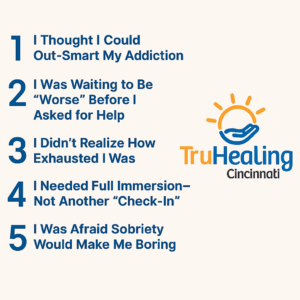I didn’t go looking for rehab. I was looking for relief.
Relief from the noise in my head. From the guilt in the morning. From the sense that my relationship with drugs and alcohol wasn’t out of control—but wasn’t really in control either.
I tried everything else first. Harm reduction. Cold turkey. Journaling. Breathwork. Only drinking on weekends. Only smoking when I was anxious. Only taking pills from people I trusted. It all worked—for a minute.
But nothing held. Not until I stepped away from trying to manage it quietly and gave myself what I was really craving: space, structure, and something honest.
Here’s what I learned about why a residential treatment program finally made it stick.
1. I Thought I Could Out-Smart My Addiction
I’m a thinker. I’d analyze my behavior for hours. Make lists. Read every Reddit post on “gray area drinking” and “microdosing for anxiety.”
I didn’t need help—I needed a better plan. Or so I thought.
But addiction isn’t a logic problem. It’s not about IQ or insight.
It’s about compulsion. Nervous system wiring. Pain you’ve stopped noticing because it’s always there.
What residential treatment gave me wasn’t more information—it was interruption.
It paused the cycle long enough for me to see it clearly. Not from inside it, but from a safe distance.
2. I Was Waiting to Be “Worse” Before I Asked for Help
I wasn’t homeless. I wasn’t unemployed. I hadn’t gotten a DUI.
So I figured I wasn’t “bad enough” for treatment. And honestly? I used that as an excuse to keep using.
But here’s the truth: You don’t have to hit rock bottom to want your life to feel better.
I learned that being “functional” while feeling hollow, anxious, or emotionally checked out was its own kind of crisis.
And when I walked into a residential program, no one asked me to prove how bad it had gotten. They just asked if I was tired of living like that.
3. I Didn’t Realize How Exhausted I Was
Trying to moderate is a full-time job.
You start every day negotiating:
- “Will I use today?”
- “How much is too much?”
- “Should I try a reset tomorrow?”
- “Does anyone notice?”
It’s mental gymnastics. And emotional isolation.
Being in a residential program took that mental load off my shoulders. I didn’t have to hide, justify, or explain. I got to rest. Reset. Let someone else hold the structure while I focused on what I actually needed—healing.
If you’re near Springfield, Ohio or Lexington, Kentucky, there are programs that offer that same kind of relief. Not a punishment. A pause.
4. I Needed Full Immersion—Not Another “Check-In”
Therapy once a week helped me see patterns. But it didn’t always help me stop them.
In between sessions, I’d fall back into habits. I’d rationalize. I’d self-sabotage.
Residential treatment worked because it wasn’t just an hour here and there—it was life, restructured.
It gave me time to:
- Understand my cravings
- Connect with people who’d been there
- Regulate my body, not just my thoughts
- Learn how to live without reaching for something to escape
And yeah, it was uncomfortable at first. But so was the way I’d been living.

5. I Was Afraid Sobriety Would Make Me Boring
This one hit me hardest.
I built my identity around being the fun one. The deep one. The artist. The one who always brought the vibes.
What if treatment took all that away?
But I didn’t lose my spark—I found it under the mess.
In treatment, I cried in ways I hadn’t in years. I laughed in ways I hadn’t since I was a kid. I wrote things that didn’t need to be filtered through a haze to make sense.
Sobriety didn’t flatten me. It deepened me. And now, I don’t disappear into substances—I show up.
So Why Did Residential Treatment Finally Work?
Because I stopped trying to change just my behavior and started healing the stuff underneath it.
Because I was finally somewhere I didn’t have to pretend, perform, or hold it all together.
Because I had structure, support, and honesty—on the days I believed in myself, and the days I didn’t.
And because I was done chasing tiny fixes when what I needed was a full reset.
Call (888) 643-9118 or visit TruHealing Cincinnati’s residential treatment program to find out what it could feel like to stop trying everything—and finally try something that works.
FAQs: Things I Googled Before I Finally Went
Do I really need residential treatment if I’m still functioning?
Yes—if your “functioning” comes with a cost. Emotional burnout, secretive using, isolation, or constant mind loops are signs you might benefit from more structured support.
What’s different about residential treatment vs outpatient?
Outpatient fits around your life. Residential gives you space to reset your life entirely. It’s immersive, structured, and designed to break the cycle from the inside out.
Will I be cut off from the world during treatment?
No—but you’ll be protected from it while you stabilize. Most programs gradually increase outside contact. You’re not being exiled. You’re being cared for.
How long is a residential program?
It varies. Many run 30–45 days, but some people stay longer depending on their needs. The focus isn’t a fixed timeline—it’s about setting you up for what’s next.
What if I’m not sure I want to be sober forever?
You don’t have to commit to “forever” right now. Just commit to giving yourself a real shot at clarity. Sobriety doesn’t have to be a sentence—it can be a season that saves your life.

